Heartbreaking DQ Opens Door for Elizabeth Beisel to Lead Team USA Once Again
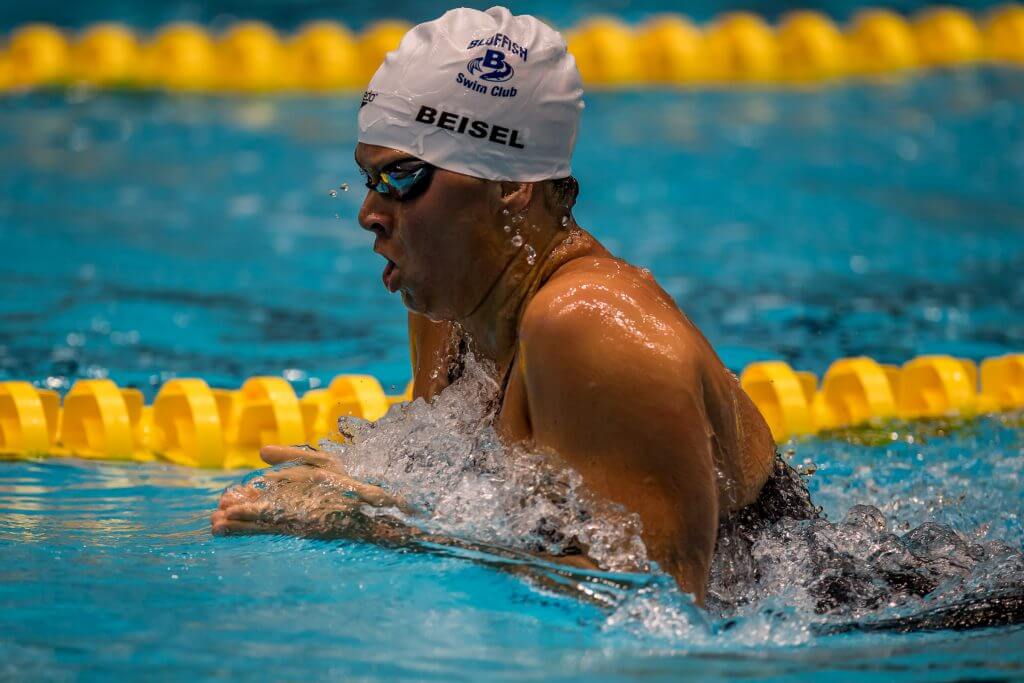
Editorial content for the 2017 USA Swimming Nationals is sponsored by TritonWear. Visit TritonWear.com for more information on our sponsor. For full Swimming World coverage, check event coverage page.
By David Rieder.
With 100 meters left, Elizabeth Beisel’s 11-year streak was cooked. Turning from breaststroke to freestyle in the women’s 400 IM final at U.S. Nationals, Leah Smith had built up a big lead, and Ella Eastin was a solid second. For the first time since she made the 2006 Pan Pacs team as a 13-year-old, a major U.S. team would assemble without Beisel.
Smith touched the wall first in 4:33.86, three seconds ahead of Eastin in 4:36.96. Beisel came in next at 4:38.55.
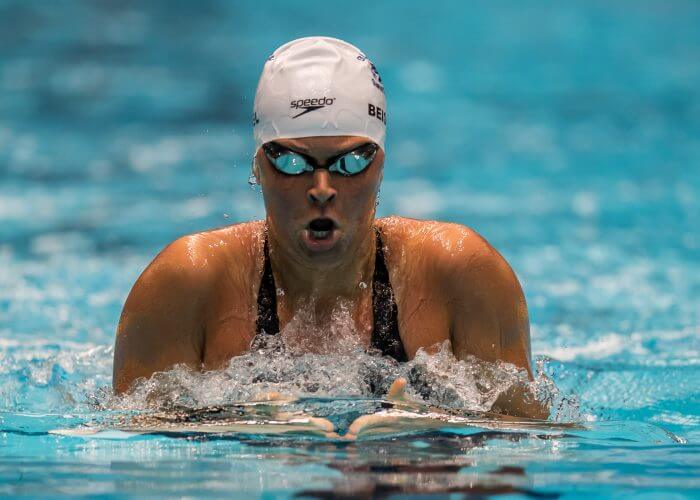
Photo Courtesy: Peter H. Bick
But Beisel was not bitter or disappointed—rather, she was proud. After a lengthy break after the Rio Olympics, that effort, she figured, was all she could expect from herself.
She embraced Smith, a typical freestyler who stunned just about everybody—herself included—with the second-fastest time in the world this year in a race she had hardly swum in years. Then, Beisel pulled herself over the lane line to find Eastin.
Beisel acknowledged to both that the U.S. had been excellent in the 400 IM for years, as she and Maya DiRado piled up World Championship and Olympic medals, but that Smith and Eastin were more than capable of taking the mantle.
“I’m telling (Eastin), ‘Girl, you are the future. I’m handing you over that 400 IM baton. Take it,’” Beisel recalled.
Eastin was overwhelmed with joy at making her first major international team. She had finally erased a four-year-old best time—by more than two seconds, to boot, and she was going to her first major international meet. She was overjoyed, and her Stanford teammates were racing behind the blocks to embrace her.
Suddenly, Eastin’s time disappeared and was replaced by “DQ.” Beisel, still in conversation with Eastin, saw it first and pointed out to the Stanford junior that something was wrong.
“I looked at the board, and I saw the DQ next to her name,” Beisel said. “I was like ‘Ella, look at the board.’ I think she thought I said something else. I’m like, ‘No, Ella, you need to look at the board.”
The entire IUPUI Natatorium was stunned. The Cardinal contingent heading to congratulate Eastin froze dead in their tracks and retreated to their seats.
Coach Greg Meehan marched across the deck to the officials’ table, taking barely a moment to acknowledge incoming freshman Brooke Forde, who had just broken 4:40 for the first time and finished fourth—after the DQ, third—in her first national final.
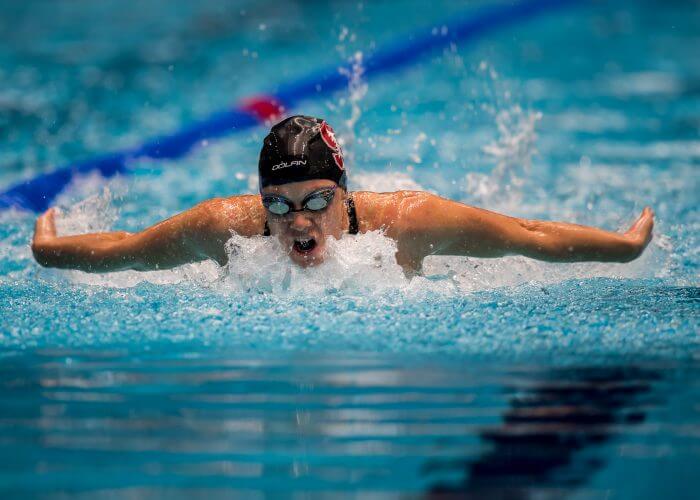
Photo Courtesy: Peter H. Bick
Eastin had been DQed for “swimming a variation of backstroke for more than one-quarter of the race.” So, too, had Bethany Galat, who had already made the World Champs team in the women’s 200 breast. Two other swimmers were called for the same violation between six heats of women’s and men’s 400 IM.
Each of the four had been closer to their back than to front when pushing off the wall for the final 50 of freestyle—infractions of the so-called “Lochte rule,” instituted after Ryan Lochte attempted to dolphin kick on his back while swimming freestyle in 2015.
Boos rained down from the stands as the DQs of Eastin and then Galat were announced. But nothing the crowd or Meehan could do to change the mind of the officials. Eastin was out—and by extension, Beisel was going to the World Championships. Her 11-year streak of swimming on the top U.S. national team would be extended to 12.
That’s a number Beisel takes incredible pride in, the consistency spanning almost half her life. But the circumstances made this one feel weird, even uncomfortable.
“I’m proud of myself,” Beisel said, “but I did not make the team under the circumstances I’m proud of. That’s never the way that I would ever want to make the team.”
But she’s on the team, and she’s going to Budapest. Even so, Beisel knows the realities of her situation: Times in the 4:38-range won’t have her contending for medals when she gets to the World Championships, and it took a full two seconds faster to make the Olympic final in the event.
Beisel, however, offers much more than just fast swimming, and she plans to give as much as she can to Team USA in and out of the pool—especially since she admits that her time in the sport might not last much longer.
“Am I a medal contender? No, probably not, but I’m going to do my best to represent the United States of America the best I can,” she said. “But for me, I bring more leadership for the team than medals. And that’s what I’m excited for, because I have one more chance to really show these young guns what to do.”
“I don’t know what the future holds in swimming for me. I don’t know if I’ll be in Tokyo. If I can really guide them in the right direction and help those new leaders coming up and have them lead the team to the most successful Olympics ever, that means more to me than winning a medal.”
A team captain last summer at the Olympics, Beisel is almost certain to fill that role again as by far the longest-tenured member of the women’s team or even the men’s. Among those she will have an eye on: Smith, who referred to Beisel as a “role model” and a “pillar of support”, will be taking her first crack in an IM event at a major international meet.
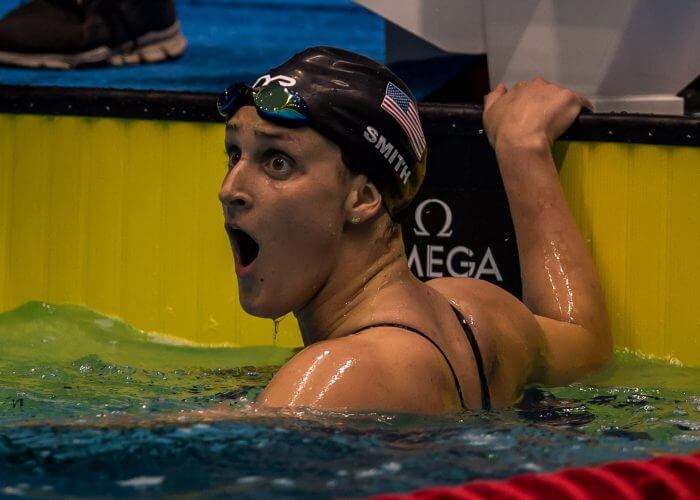
Photo Courtesy: Peter H. Bick
Smith’s time from Thursday night ranks third in the world for 2017, only 0.15 behind world record-holder Katinka Hosszu. She does look like a medal contender for Budapest—even if the 400 IM will come at the end of a long week of freestyle racing for Smith.
Beisel wants nothing more than for Eastin to be there, too.
“Ella is an incredible swimmer, and she still has 200 IM, which is her best event, and I have no doubt that she’ll be on the team Saturday,” Beisel said.
It’s not only Eastin in pain because of the untimely, unfortunate DQ. Beisel hurts for her, too. But Beisel knows—and so do the coaches and officials in USA Swimming—that the members of this year’s Worlds team will be better off for having Elizabeth Beisel around in Budapest.




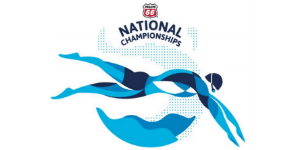
Congrats Elizabeth
Well written article!
Don’t forget the orange juice
Marianne Schumacher
What it is it with Indy and officials? Phantom DQ’s at women’s and men’s NCAAs and now this tonight.
It’s a bad look.
I guarantee Eastin did the exact same turns she did at NCAAs in March where she broke the American record. These Zebras shouldn’t be the story.
The problem is not the officials. The problem is that Ryan Lochte decided to swim almost 30% of his 200 IM entirely on his back even though the final fourth of the race is not supposed to be any of the first three strokes. FINA should have just DQed him, and this would have been done. They apparently didn’t think the rule was clear enough so they didn’t DQ him and then rewrote the rule to prevent someone else from doing what he did in the future. The rewritten rules make it very possible for someone doing a fairly normal freestyle turn to break the rule accidentally.
So, basically Lochte’s decision to break the rules fairly deliberately to gain a competitive advantage now results in the DQ of people who make small mistakes that don’t gain an advantage from their mistake. So blame Ryan Lochte for deliberately cheating and FINA for being cowardly at the 2015 worlds, not the officials who are now stuck with enforcing the new rule.
Cheating? Try innovating. At one time there was the “Berkoff Rule” which clarified David Berkoff’s innovation of underwater swimming (http://www.nytimes.com/1989/03/31/sports/swimming-fastest-backstroker-loses-a-revolution.html). There will be a clarification of the rule, likely before Worlds.
There is no fault here. Heartbreak, yes…
Not sure I agree here. Coach Marsh and Lochte exploited the rule as they understood it. FINA responded appropriately at the time, with unintended consequences. Time for the rule to evolve.
Watching the replay, it was a great call. Unfortunate call but a great call. When it is a violation of the rules and the official sees it, it has to be called. It is unfortunate that her coaches, teammates, or other officials in her career have not corrected before she messed up on such a big stage. If she did the same turn in March at NCAAs and it was missed, that is a tragedy and did not help the swimmer be successful. My philosophy of see it call it cause someday they might get caught at a bigger meet has played out in this situation. I am sorry for the DQ because it was a great swim.
I believe that it wasn’t called in March because the NCAA does not have to same rule as USA swimming and FINA does regarding the “Lochte turn”. I agree that it had to be called but still a dumb rule.
Man, that Lochte rule really changes things.
Do the swimmers realize that the Lochte turn is illegal? It does not seem so to me!